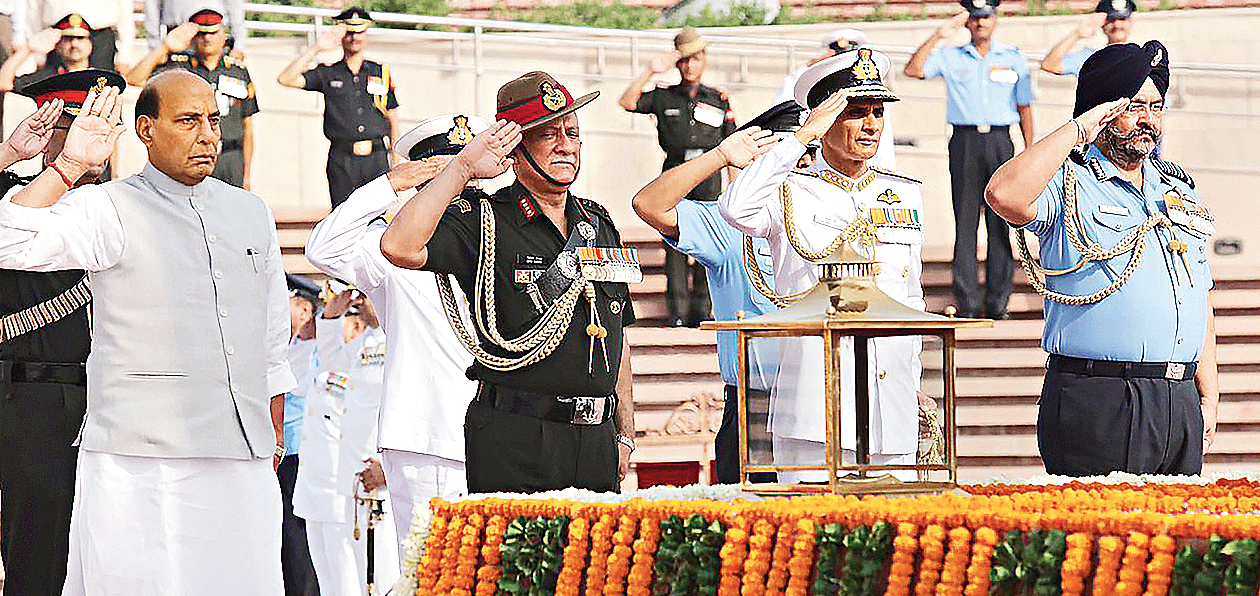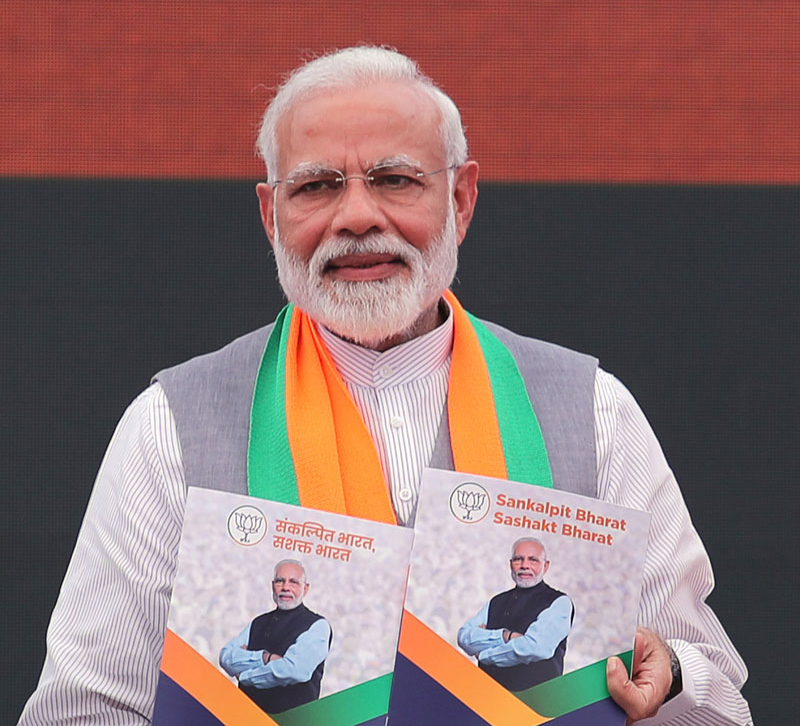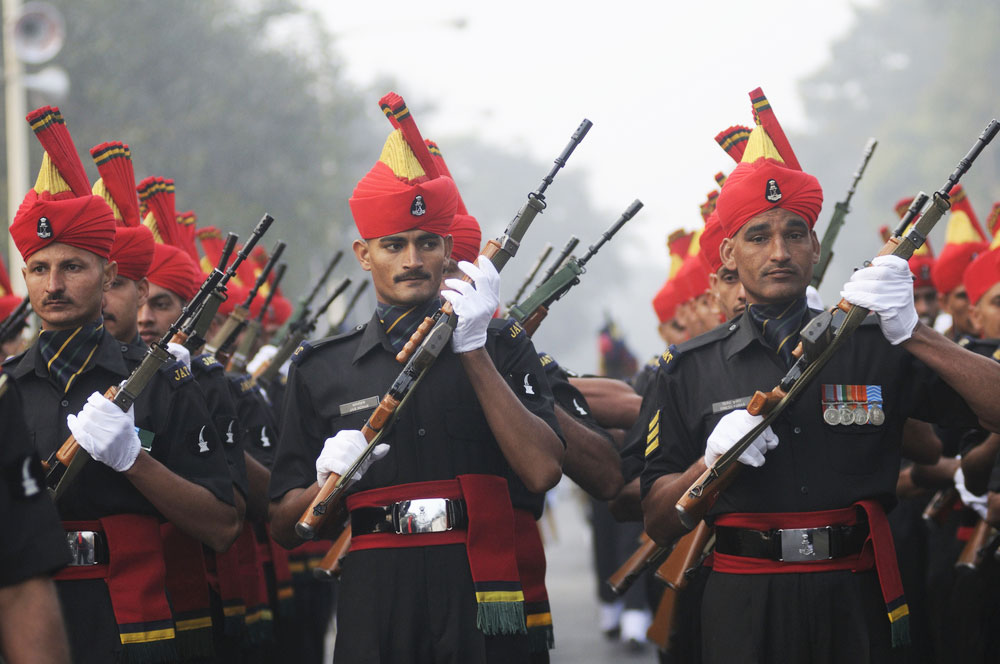The Indian electorate has delivered a decisive mandate to a single party for the second consecutive time with the expectation that this government under a dynamic prime minister will carry out much-needed reforms. Given the nature of the mandate and with a seasoned politician like Rajnath Singh as defence minister, there is hope of reform in the security sector.
During the recent elections, political parties attempted to woo voters by echoing such issues as the fight against terror and the strengthening of national security. After the terror attacks in Pulwama and Uri, national security issues have taken centre stage in political debates, along with agrarian crisis and unemployment. Yet, sadly, we fail to include the military hierarchy in key decision-making processes pertaining to national security that owes its foundation to the men and women in uniform.
The issues of concern are the non-integration of the service headquarters with the ministry of defence, absence of a single-point military advisor to the government as well as the inadequacy of military insight into our security structures. The Defence Planning Committee that has been constituted with the national security advisor as its head has created yet another tier between the military and the political leadership. There is little political impetus to correct this systemic problem in the higher defence structure.
The revamping of the national security apparatus last year by nominating two more deputy national security advisors, a military advisor, and with an increased budget is a welcome change, but the armed forces have, once again, been kept out from the decision-making loop in the National Security Council where they are represented by a military advisor. The government has shied away from appointing a military officer as deputy NSA.
In this revamped security architecture, a former RAW officer is to look after external and technical intelligence, an IB officer is to look after internal security, and an IFS officer is to look after foreign policy issues. There is no denying that these three deputy NSAs will help the cause of national security by providing valuable and timely inputs. But this structuring along with the constitution of the Defence Planning Committee and the reorganization of the Strategic Policy Group further marginalizes the military’s role in decision-making. The much-needed single-point military advice to the political leadership remains elusive still.
Ever since Independence, every elected government and all political parties have taken justifiable pride in the armed forces. However, the role and contribution of the armed forces in decision-making at the apex level of the government have been dwindling progressively. As a nation, we need to focus on cementing these glaring gaps in our security pillars. The armed forces have never let the country down and have stood like a rock, both during external and internal security threats. As a nation, we must ensure that the same continues above and beyond the politics of the day.
Narendra Modi is only the third prime minister after Jawaharlal Nehru and Indira Gandhi to be re-elected consecutively with a clear and decisive mandate. The present defence minister had excelled as home minister in the previous term and had won the hearts and minds of the police and the Central Armed Police Forces by addressing their concerns. Therefore, there is great expectation of reform in the ministry of defence.
Reform in the security sector is a complex process because it has to encompass institutions and organizations that deal with both external and internal threats to the security of the country. It is, therefore, important to have the views of the armed forces at the highest echelons of decision-making. Reorganizing higher defence management by integrating service headquarters with the ministry of defence needs to be done at the earliest. There is expectation that the defence minister’s approach to handling issues will be similar to what he did in the home ministry and that he will take direct advice from the service chiefs in an institutionalized manner. This will ensure that the reforms will not be bound by bureaucratic advice only. Inclusive decision-making will ensure improved and effective integration, modernization and genuine welfare of the armed forces.
The defence ministry continues to be manned and run exclusively by civilian officials. It defies logic that a person from postal/veterinary/sundry departments can be posted to the ministry of defence but a service officer backed by rich combat experience has no place in it. The status quoist bureaucracy has been deliberately resisting the integration of the service headquarters. In the process, it has denied the ministry professional expertise.
The Kargil Review Committee was the first serious attempt to overhaul defence management. It had recommended major changes in national security management and structure. Subsequently, in 2011, the Naresh Chandra Committee that was formed to review defence management had recommended changes. Despite all these past efforts, we continue with an obsolete system plagued by the lack of coordination and turf battles. The crucial recommendations of these committees on integration have remained unaddressed.
National security encompasses such components as politics, military, foreign policy, intelligence, economy, policing and communications. These issues are interdependent and interrelated. The elected representatives must receive unadulterated military advice. The politico-bureaucratic establishment sees nothing amiss in the present set-up despite inordinate delays caused in procurement leading to an adverse impact on operational preparedness. There is need for the military hierarchy to continue to impress upon the government to undertake necessary defence reforms.
As to how integration of stakeholders in the decision-making process makes a difference, it is amply illustrated by the manner in which the ministry of home affairs has handled the Pulwama crisis wherein the police hierarchy is integrated. The handling of issues like procurement, utilization of budgetary allocations and the welfare of troops in a positive and friendly manner is, indeed, commendable.
Post Pulwama, in spite of the home ministry being under severe criticism for lapses in the movement of convoys, there was no visibility of a blame game, the washing of dirty linen in public or news of heads being rolled. The home minister himself immediately granted permission to move all troops by air to prevent convoys getting targeted during their movement in Jammu and Kashmir. The risk component was also raised from R1H2 to R1H1 that has led to an increase in the risk allowance, which is now much higher than that of the armed forces personnel serving in the same area. Some shortcomings noticed in the equipment profile have already been addressed by deciding to procure 30-seater armour-protected buses and mine-protected vehicles.
Contrastingly, the ministry of defence — it seriously suffers from the lack of integration — continues to function like before. Its inability to comprehend the nuances of national security in the manner the ministry of home affairs visualized and acted upon such concerns is unfortunate. Today, the general perception is that the defence ministry specializes in creating obstacles and forms a stumbling block for the proposals received from service headquarters, be they procurement or the welfare of troops. There is even the propensity to delay or impede the acquisition of operational capabilities enhancements, leading to the vintage state of weapons and equipment profile in all three services. There is an absolute lack of accountability. This has led to an unprecedented situation wherein the armed forces are now fighting for parity with the CAPF in terms of status and allowances.
The two surgical strikes in the recent past by the armed forces for which the nation is thumping its chest with pride would have been much more devastating and simpler to execute had the projections for procurements for such special operations fructified earlier and not got delayed due to bureaucratic hurdles. There is a need to ensure that the military is accorded its rightful place in the security structure of the nation and remove the systemic weaknesses.













